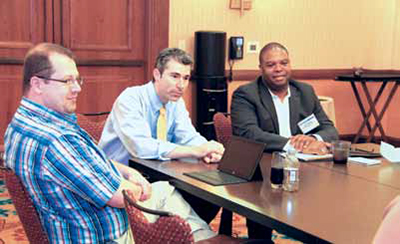Common Core: Preparing for 2014

The SchoolCIO Summit session on “Common Core: Preparing for 2014” focused on four pivotal questions related to the standards and assessments.
Embracing Common Core
“We started with Common Core standards two years ago in K-2 so that the 3rd grade students would be ready in 2014. We raised the standards and scores fell. Then we instituted PD and by December 2013, every school will be 100% wireless and teachers will have had PD. “
—Jon Williams, Executive Director/CIO, Metro Nashville Public School District
“Curricular folks and teachers are excited about the Common Core, partially because it was closely developed with our state’s performance standards in mind. Practitioners within the district are generally happy with the implementation this school year, with reports showing better understanding of numeration, math principles, and children writing and reading at a complex level at a younger age.”
—Curt Cearley, Director, Technology Services, Fayette County Schools, GA
“We are continuing the process of revising curricula to align with CCSS. New Jersey is a PARCC state and the state has requested districts to participate in the technology assessment tools for benchmarks to evaluate school readiness for the test.”
—Marianthe Williams, Director of Technology, River Dell Regional School District
Bandwidth Expansion
“Effective July 1, 2013, we will upgrade broadband to 100mb at elementary sites, and 250mb at middle and high school sites. This required negotiations with providers and, ultimately, a new contract with a new provider.”
—Scott Bailey, Chief Academic Officer, Washoe County
Tools and ideas to transform education. Sign up below.
“Our bandwidth is more than up to the minimum requirement. We also have a packet-shaping tool that will allow us to prioritize bandwidth allocation if we find the need.”
—Robert Gravina, Chief Information and Technology Officer, Poway Unified School District
‘‘Concerns about Unknowns
“My largest complaint with the assessments we give online is the unknown. Given that the assessment must work in any environment, on any platform, it should be easy to develop a matrix of what you can and can’t use. I’ve grown really frustrated with the shifting requirements and acceptable clients, applications, browsers, and operating systems. Pick a standard far enough out that I can get ready. Make that standard as ubiquitous and simple as possible to implement.”
—Curt Cearley
“There are two types of anxiety about this—freeform and specific. If we get feedback on the specific things that worry you, we can address them. While the Common Core standards are not the department’s standards, the federal government is paying for assessments and wants to make sure they will work.”
—Richard Culetta, Director of the Office of Instructional Technology at the US Department of Education
Access Issues
“We have an aggressive plan to ensure that high-density wireless is installed at all schools by December 2013. This, along with a plan to replace old computing devices, will ensure that teachers and students will have some familiarity with the use of technology in the classroom prior to the 2014 school year.”
—Jon Williams
“Common Core gave us the impetus to put more technology into classrooms.”
—Craig Williams, Director of Information Services, Illinois School District U-46
‘‘ “Over this past school year, teachers had 25 days of professional development and collaboration time to develop units of study. We pulled together teams of teachers at each grade level to take the lead on this.
—Jenith Mishne, Director of Technology, Newport-Mesa USD
Assessment Experiences
“We use a number of online assessments and have had little trouble, other than the occasional spike in Internet connectivity. We have to work on increasing our pipe to the outside, but calculating the proper amount of bandwidth I haven’t found as easy as just following the recommendations.”
—Jon Castelhano, Director of Technology, Apache Junction USD

“We give very few major online assessments currently. However, when we do, we give them in small groups to avoid overloading the Internet connection. This has worked well for several of the online assessments we use.”
—Todd Helringel, Midwest Central CUSD 191
Preparing for the Common Core
SET UP CURRICULUM COMMITTEES
• Create clearly identified goals
• Develop groups made up of teachers, administrators, and an outside consultant
• Unpack the CC standards, set learning targets, and develop I Can statements
• Develop K-12 scope and sequence
DISSEMINATE THE NEW CURRICULUM
• Provide district, building, and grade/ department level in-services
• Determine the necessary instructional materials
• Utilize MAP/Common Core MAP to assist in benchmarking needs and program evaluation
• Provide teacher in-services in using data effectively
ASSESS IMPLEMENTATION OF THE NEW CURRICULUM
• Focus teacher observations on new expectations
• Utilize MAP/Common Core MAP to assist in identifying staff development needs
• Use Compass/MAP integration to support differentiation
• Hire ECRA to assist in data analysis and program review
• Work on preparing infrastructure for PARCC
• Return to one desktop lab in each elementary school for testing (MAP & PARCC)
—Steven M. Baule, Superintendent, North Boone CUSD 200
TOOLS THEY USE
• AIMS/WEB
• Aruba wireless
• ASUS tablets
• Bamboo Capture
• Brocade POE switch
• Camtasia
• Chromebooks
• Cisco networking equipment and wireless
• Compellent SAN
• Data Domain backup
• Dell & HP desktops and laptops
• Dell computers
• Destination Reading
• eBoard
• Edutyping
• EMC SAN
• Exinda
• Google Apps for Education
• Google Nexus devices
• HP Folio
• iBoss content filter
• Infinite Campus SIS
• iPads and iPods
• Jing
• Math Buddies
• Meru wireless access points and controllers
• Microsoft surface tablets
• Mobi Math
• nComputing
• Optiman
• Renaissance responders
• Samsung and Prodigy Android media tablets
• SAP
• SchoolWires
• SMART Boards
• WIN* tablets
Gwen Solomon was Founding Director of The School of the Future in New York City, Coordinator of Instructional Technology Planning for New York City Public Schools, and Senior Analyst in the U.S. Department of Education’s Office of Instructional Technology. She has written and co-authored several books and many magazine articles on educational technology.
